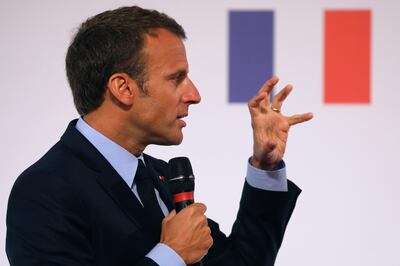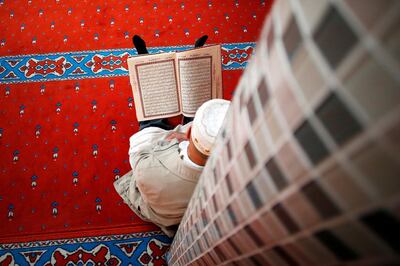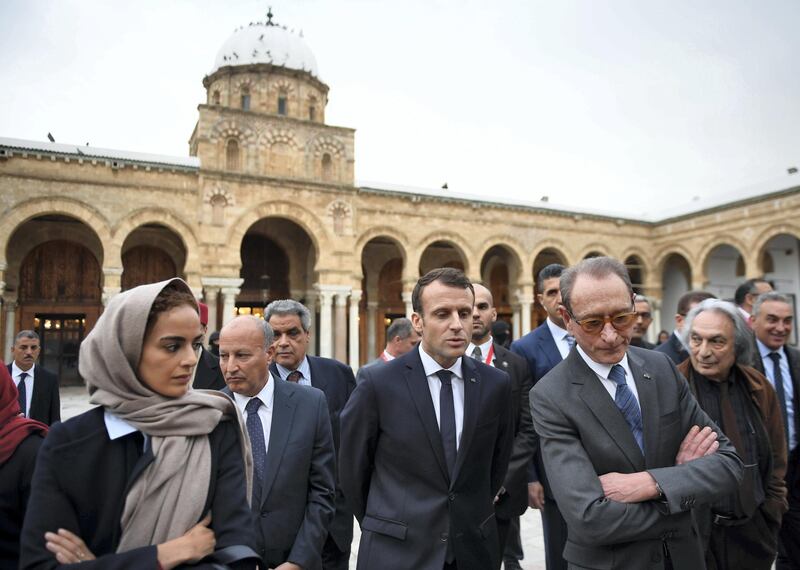President Emmanuel Macron is preparing to tackle head-on France's troubled past and present relations with organised Islam, with sweeping changes that could infuriate Muslim leaders.
The 40-year-old, in power for one year, is struggling with domestic crises despite growing international acclaim, yet he is about to delve into religion.
In June he is expected to announce curbs on foreign involvement in Islam, as well as the creation of a national organisation for Europe's largest Muslim population.
This could replace or reform the CFCM (Conseil Français du Culte Musulman, or French Muslim Council), established in 2003 by a former president, Nicolas Sarkozy, when he was interior minister in Jacques Chirac’s centre-right government.
Riven by internal rivalries, the council has failed to assert itself as the principal voice of Islam in France. It is seen by many observers, including some prominent Muslim figures, as fragmented, inefficient and only partly representative.
There is speculation that Mr Macron may favour a Muslim Consistory body and a "Grand Imamate", with a figurehead comparable to the Jewish chief rabbi.
Presidential advisers admit that even for a determined reformer, involving himself in the affairs of a religion leads Mr Macron into sensitive territory, but he is said to be committed to a root-and-branch overhaul that will also deal with the funding of mosques and training of imams.
____________
Islamic terrorist threat clouds French call for unity
In France, Islamophobic scapegoating and authoritarianism rises
____________
Mr Macron has discussed his proposed roadmap for Islam in France with religious, academic and political figures, including heads of state during visits to the Arabian Gulf and France’s former colonies in North Africa.
The president aims to move France beyond what one official called "a consular Islam", a comment interpreted by France's leading Sunday newspaper, Le Journal du Dimanche, as meaning "an end to foreign – Algerian, Moroccan, Tunisian and Arabian Gulf – influences on France's second religion", after Catholicism.
His speech is to be delivered soon after Ramadan ends – around June 14 – and before the national Bastille Day holiday a month later. It follows the publication of a 60-point government plan to counter Islamist radicalisation and his announcement of a new strategy for combating deprivation and insecurity in France's immigrant-dominated city suburbs known as the banlieues.
But Mr Macron faces stiff opposition from community leaders, while some academics are warning him not to treat the Muslim population as a single entity or, worse, "the enemy within". The diversity of French Muslims is illustrated by the existence of several other bodies, from those concerned mainly with theology and the provision of adequate places of worship to groups with links to the Muslim Brotherhood.
One scathing Muslim critic of Mr Macron mocked him as France's new "sun king", a reference to not only Louis XIV's notorious vanity but the monarch's calculated persecution of a religious minority, the Protestant Huguenots.

In an article reproduced at a Muslim website which studies the development of mosques (desdromesetdesminarets.fr), the blogger Issa Ar-Rumi rounded on the president's choice of figures to consult. They included the chief rabbi of France and a former adviser to Zine El Abidine Ben Ali, the Tunisian dictator driven from power at the start of the Arab spring in 2011.The National understands that he president has not consulted the CFCM.
"Those who naively dreamed of a new era under the reign of Macron are now paying the price," Mr Ar-Rumi wrote.
"Presidential mandates follow one another, faces change but deep contempt for the Muslims of France remains the norm."
France has made several unsuccessful attempts to build harmonious relations with its Muslim population, variously estimated at between 4 million and and 8 million. Those of Maghrebin origin still resent France’s brutal resistance to Algerian independence, finally granted 56 years ago, although freedom from Paris rule was achieved much more peacefully by neighbouring colonies Tunisia and Morocco.
___________
Read more:
Macron faces big challenge in defining Islam's place in France
Macron risks parliamentary unity with controversial new immigration plans
___________
Among the indigenous population, there is some hostility – reflected in continuing, if minority, support for the far-right Front National – at large-scale immigration from North and sub-Saharan Africa.
The far right, and elements of the mainstream right, blame recent high-profile terrorism, crime and the so-called "Islamicisation" of France on these ethnic minorities.
Elysee aides stress that Mr Macron intends a step-by-step approach, reflecting the delicacy of the challenge he has set himself. It does not affect his determination to ensure French Muslims have "full control of their faith, that financial flows are controlled and controllable … and that everything is constitutionally correct", one source said.
In the battle of French Muslim institutions, Muslims of France (MF) – previously UOIF (the Union of Islamic Organisations in France) occupies a intriguing place. It was listed by the UAE in November 2014 as a terrorist organisation.
The Muslim Brotherhood is regarded in similar terms by not only by the UAE but Egypt, Saudi Arabia, Russia, Syria and Bahrain. The UOIF dismissed the designation as insulting. Soon after its name changed, the president Amar Lasfar insisted the organisation was not part of the Muslim Brotherhood, although it shared its "way of thinking" and considered itself essentially as representing Islam in France.
Paradoxically, a prominent moderate imam who has recently severed links with MF is among the Muslim figures most courted by French political leaders.

Tareq Oubrou, against whom ISIS issued a fatwa two years ago calling for his murder, is a knight of the French Legion d'Honneur, and adopts a broadly liberal outlook, arguing for Muslims to be "discreet" in manifesting their faith and insisting that nothing in the Quran obliges a woman to cover her hair, but that she is required only to be modest.
Mr Oubrou once said that but for the then UOIF, "I would be a Taliban". He says he left because he did not consider himself an "organic intellectual theologian – my ideas cannot be contained in a system".
Speaking to The National, he said there was a need for mutual tolerance. The government "must rise above the least suspicion of discrimination and ensure universal values of equality and justice".
Mr Macron's role, according to Mr Oubrou, was not to direct the course to be taken by French Islam but to advise. He was among those consulted by the president and it was his suggestion that a consistory body should be formed, bringing together different organisations under one administration.
In lengthy exchanges in Le Journal du Dimanche with a former socialist prime minister, Manuel Valls, now an independent loosely tied to Mr Macron's centrist La Republique En Marche, he also appeared to caution the president against going too far in his long-awaited speech.
"As soon as politics begins to interfere with religion, it exceeds its proper role," he said. "It has the right to ask questions of religions but that is not the same as ordering them to do this or that."
But the French Muslim Post news site, lamenting the president's failure so far to accept CFCM's invitation to attend its iftar on June 12, quoted a source close to its president, Ahmet Ogra, as expressing "deep discomfort" and fearing rising tensions.
"The government is trying to take over Islam," the source said.
Concerns are not confined to Muslims.
"If collective representation is messy and blurry, it is because there is no such thing as a 'Muslim minority'," said Fabien Truong, associate professor in the sociology and anthropology department of Paris University 8, who wrote Radicalised Loyalties: Becoming Muslim in the West.
"Muslims are a divided population, not a monolith, which is actually good news in a country valuing free speech and debate. Having more regulation of the imam recruitment process could be a good thing … one cannot ask for stronger regulation and control without normalisation and pacification regarding Muslims' religious presence. Transparency should work both ways."






